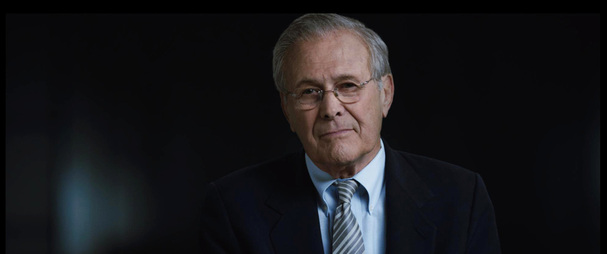The Unknown Known is the new documentary film by Errol Morris, in somewhat the same vein as his earlier work, The Fog of War. This time, he turns his camera on Donald Rumsfeld. The lens through which the story is told is what Rumsfeld calls his “snowflakes”, short to-the-point memos distributed to numerous staff members in the Pentagon and the government as a whole. The film covers both his stint as Secretary of Defense under Ford in the 70s during Vietnam, and (more infamously) during the Iraq War in the early 2000s.
The thing about this film is, it’s not about the Iraq War or the Vietnam War. This film is not about any period of history, or any particular conflict; it’s about Donald Rumsfeld. Specifically, it’s about his viewpoint, and his perception of historical events and his reactions to them. The Unknown Known never presumes to tell you any kind of truth. It is Donald Rumsfeld reading his “snowflake” memos, and talking about why he said what he said and why he did what he did.
That being said, the movie does present a foil to Rumsfeld, through clips of news media. The format is that Rumsfeld will read a snowflake pertaining to some issue, explain why he wrote that, and then a clip from relevant news will be shown, in a similar vein to The Daily Show. What I like about the way Morris structures the film is that he never talks about what actually happened. All you see is what happens before (a snowflake) and the response (the news). You are presented with two distinct perceptions of the same event; the before and after, the public and private. It is up to you, the viewer, to make a choice between these different viewpoints.
This structure is at once the film’s greatest strength and weakness. On the one hand, the film does a great job at exploring the mind of Donald Rumsfeld, and I applaud it for that. But on the other hand, I do wish that it probed a little deeper. Maybe it could have placed some emphasis on facts that might shed some light on what actually happened, and then juxtaposed it with Rumsfeld’s and the media’s perception of it. But then, I suppose that would simply be another version of the truth.
Don’t go into The Unknown Known thinking you’ll walk out knowing something more about the war in Iraq. Don’t think you’ll learn something about governance. The only thing you will truly learn about is the mind and perception of a single man, and why he did what he did. It’s up to you to decide which is the greater and lesser truth.
Grade: B-

 RSS Feed
RSS Feed
